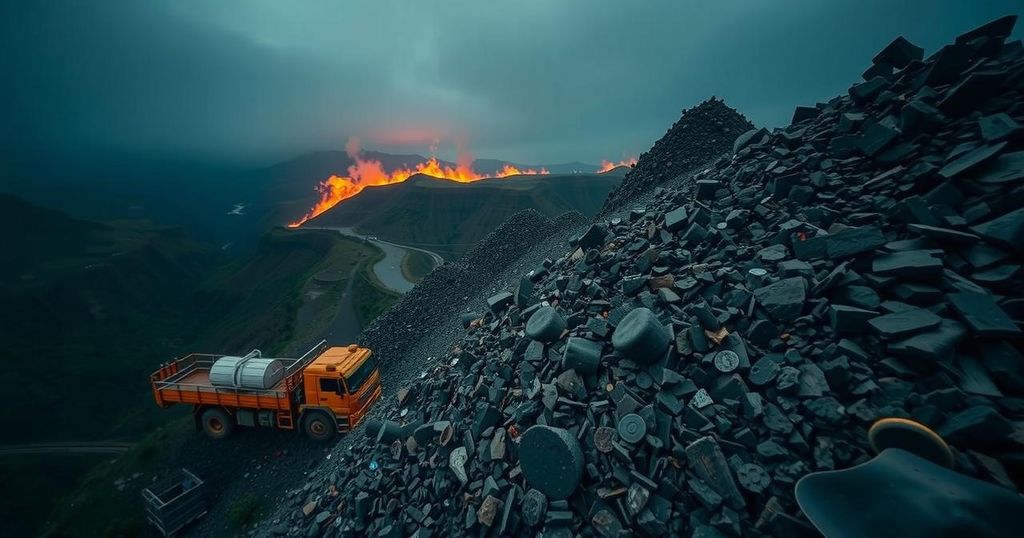Illegal Mining Crisis in Ghana Ahead of Presidential Election
The illegal mining crisis, particularly ‘galamsey’, is undermining Ghana’s cocoa production and contaminating water supplies, posing a serious challenge ahead of the upcoming presidential election. Despite the surge in illegal mining driven by high gold prices, Ghana is failing to benefit economically due to rampant smuggling. Both presidential candidates have promised to combat galamsey, but its socio-economic implications complicate the resolution process.
As Ghana prepares for its presidential election, a significant challenge looms: the rise of illegal mining, locally referred to as ‘galamsey’. This unsanctioned activity has not only diminished the country’s cocoa production but has also contaminated water sources and fueled rising food inflation. The proliferation of galamsey, exacerbated by soaring global gold prices, deprives Ghana, the continent’s leading gold producer, of substantial economic benefit as much of the extracted gold is illicitly smuggled abroad.
Illegal miners typically open makeshift pits, utilizing hazardous chemicals, including mercury and nitric acid, to extract gold, thereby polluting nearby water bodies. Recent trends indicate that the involvement of Chinese entrepreneurs, who often supply advanced machinery and collaborate with local leaders, has amplified the rate of illegal mining. This encroachment into agricultural land has severely hampered cocoa output, with projections indicating a nearly 40% decline compared to industry expectations for the 2023/24 growing season, a situation worsened by climate challenges and diseases affecting crops.
In August, the Ghana Water Company raised alarms regarding potential water shortages linked to pollution from illegal mining, inspiring protests aimed at placing galamsey on the political agenda ahead of the December 7 elections. Historically entrenched, illegal mining has transformed into a lucrative venture for communities and political figures alike. Kweku Awotwi, a prominent Ghanaian business executive, remarked, “A lot of the money is being used to support political parties.”
The electoral contenders, Mahamudu Bawumia from the ruling New Patriotic Party (NPP) and John Dramani Mahama from the National Democratic Congress (NDC), have both pledged to address the galamsey crisis. Bawumia has proposed establishing a minerals development bank and streamlining the licensing process for small-scale mining, whereas Mahama aims to launch a gold board for improved mining regulations and propose reconversion of mining sites for agricultural use.
The illegal mining sector has surged, with small-scale operations generating 1.2 million ounces of gold in the initial months of 2024, surpassing the entire output of 2023. However, the majority of this production is clandestinely exported, contributing nothing to the national revenue stream. The agricultural sector, particularly cocoa farming, is experiencing severe disruptions as many farmers grapple with land degradation.
The impending transition to a new presidency embodies both a dilemma and opportunity, as the newly elected leader must navigate the complexities of entrenching these illicit operations while striving to restore economic stability in the aftermath of a significant debt crisis. While galamsey offers various employment opportunities, the challenge lies in formalizing these operations to enhance safety standards and integrate them into the formal economy, illustrating a model for other African nations with similar issues.
Amidst the discussion, Seth Twum-Akwaboah, CEO of the Association of Ghana Industries (AGI), contended that the depreciation of the cedi and inflation posed greater immediate challenges for businesses than illegal mining, labeling the latter a potential future concern if it remains unchecked. However, Mavis Owusu-Gyamfi, CEO of the African Center for Economic Transformation (ACET), noted that the ramifications of illegal mining are significant. “We’re already not producing enough food for ourselves and relying on imports to feed our people,” she asserted, highlighting the socioeconomic and environmental impacts.
Illegal mining, specifically the galloping activity termed ‘galamsey,’ has been a pressing issue in Ghana, particularly in light of rising gold prices that have intensified these practices. This unauthorized extraction severely disrupts agricultural output and increases pollution, which poses a significant threat to essential resources such as water. The political ramifications are equally notable, as both societal and political elites have garnered financial benefits from this illegal trade, complicating efforts to regulate and control galamsey effectively. With Ghana heavily reliant on cocoa as a primary export, the decline in production potential due to illegal mining impact on the economy. The forthcoming presidential election places pivotal decisions regarding mining regulations within the political arena, revealing the intersection between economic stability and ethical governance. Strengthening formal mining operations as a solution could provide the dual benefits of generating tax revenues and improving safety standards in the mining sector, which is essential for both economic recovery and environmental sustainability in the country.
In summary, Ghana’s illegal mining crisis presents a multifaceted challenge that the incoming government will likely confront following the presidential election. The detrimental effects of galamsey extend beyond just the mining sector, impacting agriculture, water resources, and political integrity. Both candidates have pledged to address these issues, but finding a balance between regulation and the socio-economic benefits derived from these illegal activities will be pivotal. As stakeholders push for reforms, incorporating the illegal mining sector into the formal economy may emerge as a viable solution to leverage its economic potential while safeguarding the environment and public health.
Original Source: www.semafor.com




Post Comment